Two personable musicians, who win on all fronts: at the pinnacle of their highly competitive and skilled professions, highly articulate, and perhaps unlikely partners in their art. In one corner, ladies and gentlemen, the composer, world-leading jazz trumpeter, teacher, head of Lincoln Center Jazz, the New Orleans-born Wynton Marsalis, 55. In the other, Nicola Benedetti, 29, the Scottish classical violinist, teacher and leading campaigning proselytiser for the importance of music in all spheres.
Miss Benedetti played the premiere of Wynton Marsalis’s Violin Concerto in D, with a mere 100 players of the London Symphony Orchestra, at the Barbican last November, and this hour-long film traced its gestation. Like the great past composers of classical concerti – Mendelssohn, Brahms, Sibelius, say – Marsalis composed with an outstanding virtuoso player in mind. Although Nicky, as the programme called her, told us Wynton was a mentor, it wasn't clear from the programme where and how they met. She asked him to write for her something she would love to play; it was to be a bumpy ride.
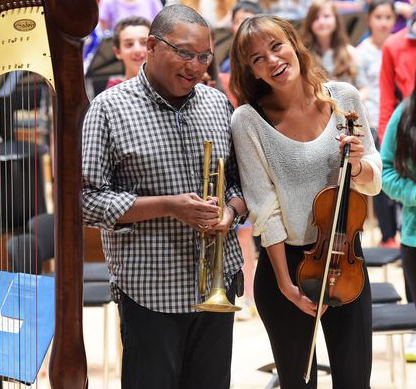 We were made vividly aware of the enormous amount of joint work each of them took on as they went through the manuscript again and again. It was as much as anything an essay on co-operation, including the protagonists, conductors, and Wynton’s skilled copyist, Jonathan Kelly. They met and discussed over a period of nine months – a symbolic coincidence, anyone? The collaboration took place in New York City, London, and Chautauqua in upstate New York, where they had an informal premier which was essentially a workshop and rehearsal with an orchestra under conductor Cristian Măcelaru.
We were made vividly aware of the enormous amount of joint work each of them took on as they went through the manuscript again and again. It was as much as anything an essay on co-operation, including the protagonists, conductors, and Wynton’s skilled copyist, Jonathan Kelly. They met and discussed over a period of nine months – a symbolic coincidence, anyone? The collaboration took place in New York City, London, and Chautauqua in upstate New York, where they had an informal premier which was essentially a workshop and rehearsal with an orchestra under conductor Cristian Măcelaru.
There were some frank observations: the first half of the concerto was too dry, and the second half too much. The conductor pointed out that when a composer first heard his work being played he was usually startled, as it was so different to what he had in his head. Then Wynton calmly said he heard a lot of significant changes he wanted to make, and sent the LSO brand new sets of parts. Wynton changed things all the time, often indicating rhythms when talking to Nicky by just beating them out with tapping and humming. Jazz met classical, or did it?
The tensions were variable but palpable. Wynton had previously composed major works inflected by jazz, but here there was conflict between having a working stable manuscript and his continual impulse to change and change again, making huge technical demands on the soloist. Nicky gently pointed out the unthinkable; the orchestra Wynton wished for, with a full complement of brass, wind and percussion, was a third larger than most orchestral collaborations with a soloist. Her playing could easily be drowned out. She was increasingly concerned about clarity versus confusion. Above all watching her practise, we were made aware of the sheer stamina and the high level of physical fitness, let alone mental capacity and even athleticism, a musician needs.
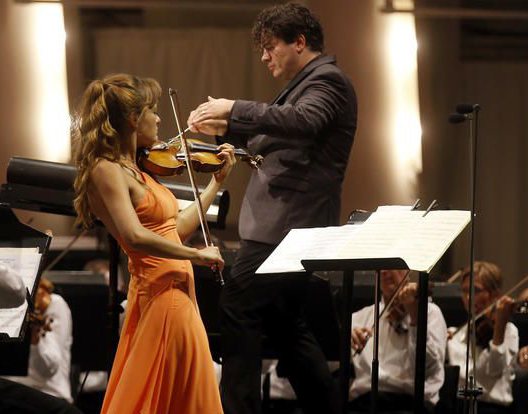 There were almost insuperable technical difficulties. At one point, the ever charming and courteous Nicky suddenly got up when looking over the manuscript with Wynton and said “I can’t do this, I’m sorry.” In the context of their mutual respect and devotion to the cause, her polite despair was truly shocking in a way which underlined the audacity of the whole undertaking. Marsalis’s concerto called on countless idioms from jazz and folk to dance and classical, its range identified by the naming of the four movements: Rhapsody, Rondo Burlesque, Blues, Hootenanny. It's New World in spirit but harking back to Old World folk and African rhythms, too.
There were almost insuperable technical difficulties. At one point, the ever charming and courteous Nicky suddenly got up when looking over the manuscript with Wynton and said “I can’t do this, I’m sorry.” In the context of their mutual respect and devotion to the cause, her polite despair was truly shocking in a way which underlined the audacity of the whole undertaking. Marsalis’s concerto called on countless idioms from jazz and folk to dance and classical, its range identified by the naming of the four movements: Rhapsody, Rondo Burlesque, Blues, Hootenanny. It's New World in spirit but harking back to Old World folk and African rhythms, too.
Above all, this was a documentary about work, and people who loved what they did. Nicky practiced up to 14 hours a day when the going got even tougher, and Wynton, writing to the last, was managing on two to three hours of sleep. At the world premiere, Nicky said she wasn’t panicking – just really nervous. And it wasn’t quite all right on the night (this reviewer was there) but the audience was justly wowed, at least by the ambitions of both composer and soloist. For the viewer of this documentary about creation, which proved the old adage – one per cent inspiration, 99 per cent hard work – the opportunity to spend some time observing and hearing from such remarkable people was a profound pleasure.

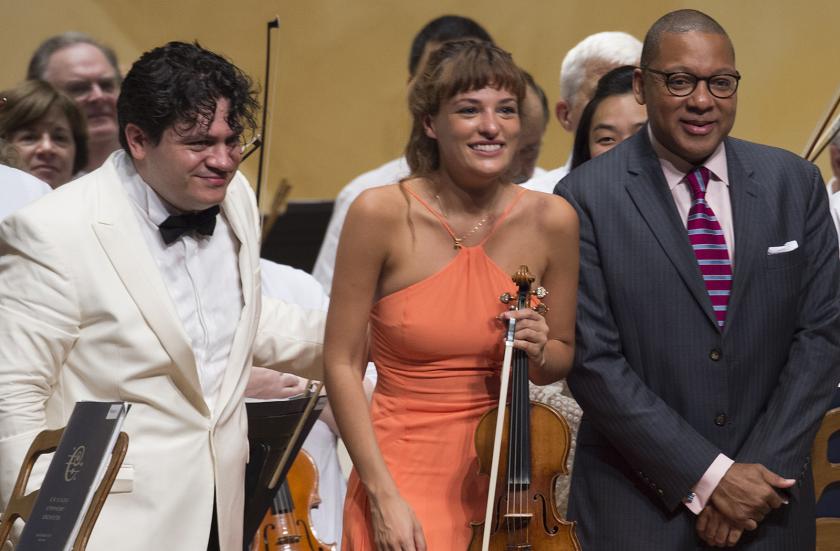



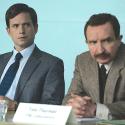

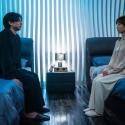




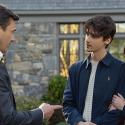

Add comment